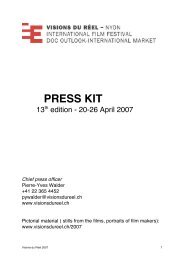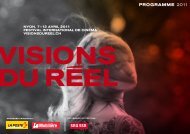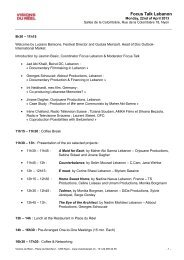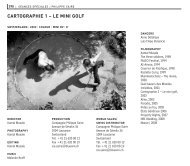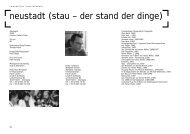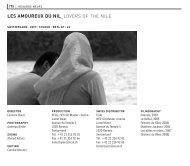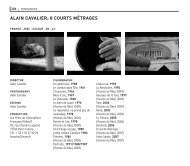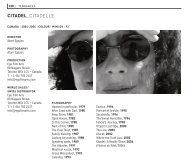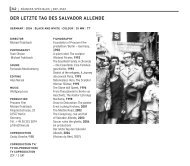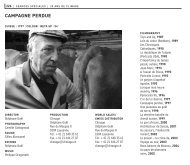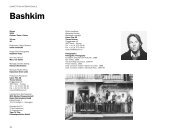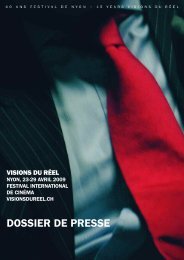Katalog 2013.pdf - Visions du Réel
Katalog 2013.pdf - Visions du Réel
Katalog 2013.pdf - Visions du Réel
Create successful ePaper yourself
Turn your PDF publications into a flip-book with our unique Google optimized e-Paper software.
218 atelier – eyal sivan<br />
A “WELL-INTENTIONED”<br />
DIRECTOR<br />
A CONVERSATION WITH EYAL SIVAN<br />
Jean-Luc Godard said that<br />
cinema is truth 24 frames per<br />
second. What is your take on<br />
this idea<br />
I think it is a very provocative<br />
notion. If you take it in a very<br />
linear way it gives you the<br />
impression that 24 images per<br />
second are the truth all the<br />
time. But I’d take it in a Benjaminlike<br />
way (i.e. in the sense of<br />
philosopher Walter Benjamin),<br />
of just flashes of truth. This<br />
is only 24 frames per second<br />
and then is no more than that.<br />
It is not a notion of relativity,<br />
but a notion of status.<br />
Of course the first image is in a position<br />
of truth but what we are discussing<br />
is flashes. And flashes are immediately<br />
about the past. In a sense, when we say<br />
cinema we say “past”, even if our relation<br />
to it is to the present. The relation<br />
to the past involves the notion of truth<br />
as well because it integrates the notion<br />
of memory. I think that this is something<br />
very important, when you think about<br />
this idea of the 24 frames per second<br />
as truth. It is just seconds of truth. Not<br />
“the” truth. It is not the T-R-U-T-H. It<br />
is just moments that we relate to the<br />
idea of truth. I like very much Michel<br />
Foucault’s idea that refers to the “status<br />
of truth”. We project a status of truth<br />
on the image. This is my general relation<br />
to cinema. It’s a double notion. It’s<br />
a contract that is based on accepting a<br />
moment of truth. It is not about trying to<br />
build an image of absolute truth, which<br />
is a totalitarian stance.<br />
What do you think of the fact that documentaries,<br />
even the so-called militant<br />
ones, have more or less accepted<br />
exactly this idea of totalitarian truth<br />
First of all, I do not put the documentary<br />
outside of the history of the emergence<br />
of the moving image and cinema, which<br />
is in fact the emergence of documentary<br />
itself. This is the first point. The other<br />
one is never to forget the very direct<br />
relationship between the documentary<br />
and power. In fact, if there is something<br />
that defines power, it is to impose<br />
the notion of truth itself. Obviously it<br />
does not mean it is the truth. It simply<br />
means it imposes the notion of truth.<br />
Documentary cinema has a long history<br />
in common with power. Of course,<br />
it also has a history of counter-power. If<br />
we think about what the documentary<br />
tackling the idea of power looks like, it<br />
is exactly that that challenges the idea<br />
of truth. It is of course linked to the<br />
themes, the subject, the issues that the<br />
documentary is dealing with.<br />
One of the critiques that we should<br />
address to documentary is its humanistic<br />
take. A universally humanistic<br />
attitude. The main problem in this<br />
humanistic attitude is that it always tries<br />
to impose “the” truth. In fact, there is a<br />
relation of power from the very beginning<br />
of the history of documentary.<br />
We have the power - the ones that have<br />
the camera, the ones that have the<br />
frame, the ones that have the possibility<br />
to create the frame. We hold the power:<br />
which means that we hold the truth and<br />
what we are showing is, therefore, “the”<br />
truth.<br />
I think that the most crucial element of<br />
the documentary is in fact to challenge<br />
this position of power. To challenge this<br />
kind of truth that is the result of the<br />
relationship to and with power. It is not<br />
important to show what we pretend is<br />
the truth, but to tackle exactly this idea<br />
by proposing a counter-power.<br />
What is really fascinating in your film<br />
Etat commun – Conversation potentielle<br />
[1] is that you try to challenge<br />
the idea of truth in the field. You challenge<br />
this idea through the ‘mise en<br />
scene’ of speech. Through this way<br />
of working, your film results in the<br />
ultimate anti-talking heads film. It is a<br />
film that, through the ‘mise-en-scène’<br />
of speech, challenges the boundaries<br />
of languages and the idea of truth that<br />
comes with it.<br />
Etat commun was a very complex film<br />
for me to make in terms of ‘mise en<br />
scene’. From the very beginning the<br />
question was how to build a fiction and<br />
give it a status of truth. We are going<br />
back to the notion of “status of truth”.<br />
I’ll explain myself. In fact, this film is a<br />
fiction in its form because it is something<br />
that already puts in the present<br />
tense something that is just potential.<br />
Something that is a possibility of the<br />
future. In this way it makes the future,<br />
the potential, not just a possibility, but a<br />
reality. In this way, it is no longer an “it<br />
can be”. It’s an “it is”, which means there<br />
is a conversation that is taking place,<br />
and a conversation is always a ‘mise en<br />
scene de la parole’. There is a performance<br />
of speech. This performance will<br />
therefore raise a crucial question. Even



